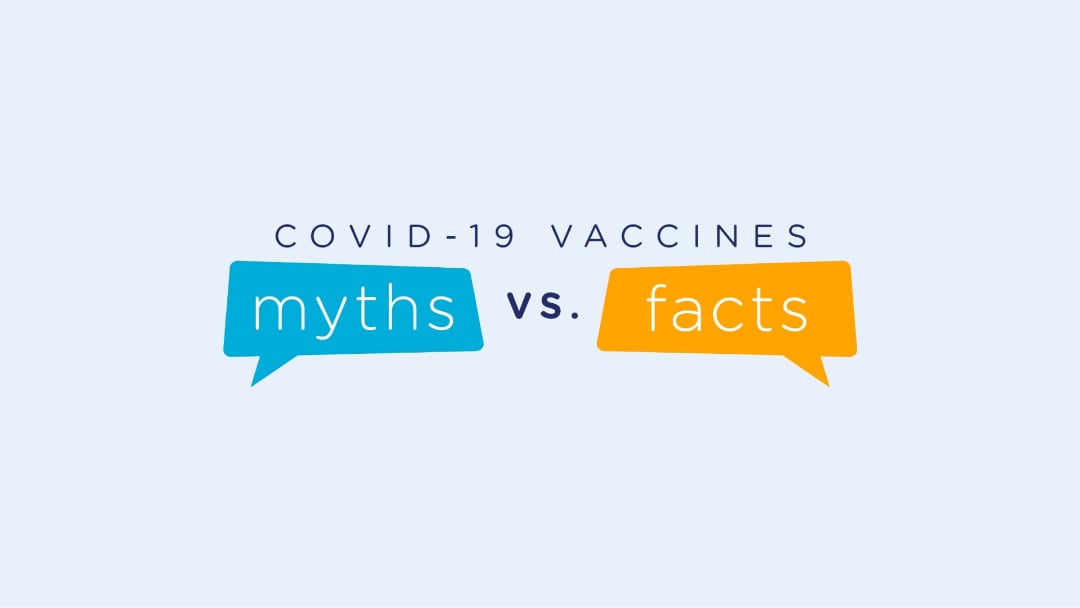
By Gregory Brusko, DO, Chief Clinical Officer, Ascension Wisconsin
News Graphic April 6, 2021
As the COVID-19 pandemic continues to affect people worldwide, access to safe and effective vaccines is critical to stopping the spread and keeping people healthy. With the authorization and distribution of three COVID-19 vaccinations in the United States, there are many questions about who should receive the vaccine, concern about side effects and efficacy and hope that this will bring an end to a pandemic that has affected millions worldwide for more than a year.
Understanding fact from fiction is an important first step when considering vaccination.
Myth: If I’ve already had COVID-19, I don’t need a vaccine.
Fact: Every eligible person should get vaccinated regardless of whether they have already had COVID-19. We do not yet know how long a person is protected from getting sick again after recovering from COVID-19, which is why it is important to get vaccinated to prevent further illness and/or hospitalization. Since every individual’s health history is unique, talk with your clinician about an appropriate time to get vaccinated after a COVID-19 infection.
Myth: The vaccine will make me sick with COVID19.
Fact: Not true. None of the authorized and recommended COVID-19 vaccines or COVID-19 vaccines currently in development in the United States contain the live virus that causes COVID-19. This means that a COVID-19 vaccine cannot make you sick with COVID19.
All of the vaccines available today “teach” our immune systems how to recognize and fight the virus that causes COVID-19. Sometimes this process can cause symptoms, such as fever, body aches, chills that may last for a few days. These symptoms are normal and are a sign that the body is building protection against the virus that causes COVID-19.
Myth: The COVID-19 vaccine causes infertility in women.
Fact: There is no evidence suggesting that fertility problems are a side effect of any vaccine. According to the CDC, experts believe that COVID19 vaccines are unlikely to pose a risk to a person trying to become pregnant in the short or long term.
Scientists study every vaccine carefully for side effects immediately and for years afterward. The COVID-19 vaccines are being studied carefully now and will continue to be studied for many years. People who are trying to become pregnant now or who plan to try in the future may receive the COVID-19 vaccine when it becomes available to them.
If a woman is vaccinated against COVID-19 prior to the birth of her child and chooses to breastfeed, she will provide passive immunity to her child. Passive immunity gives antibodies to the child and protects them from contracting COVID-19 during the early months of their life.
Myth: Scientists rushed vaccine development, so its effectiveness and safety cannot be trusted.
Fact: All vaccines require extensive research, documentation and closely monitored clinical trials to determine effectiveness and safety before being submitted by pharmaceutical companies for approval. The U.S. Food and Drug Administration (FDA) is responsible for ensuring the safety, effectiveness and availability of vaccines in the United States. The FDA requires extensive testing and reporting of results by manufacturers before making vaccines available to the public to protect safety and identify any potential side effects.
Given the widespread impact on health and safety, the global medical and research communities have placed unprecedented urgency and collaborative focus on developing a COVID-19 vaccine. While these vaccines are available to the public faster than is typical, they passed clinical trials and have undergone rigorous testing to help ensure effectiveness and safety. All three approved COVID-19 vaccines demonstrated high levels of effectiveness in preventing serious illness, hospitalization and death.
While the COVID-19 vaccines were completed within a year - they were built upon research that began decades earlier with the SARS-CoV-1 outbreak in the early 2000s. Since that outbreak subsided, the research stopped as vaccines were no longer needed. With the current SARSCoV- 2 (COVID-19) pandemic, scientists used a lot of that information, and information learned in subsequent years, to forge ahead and create a vaccine in record time.
Myth: The COVID-19 mRNA vaccines will alter my DNA.
Fact: Not true. COVID-19 mRNA vaccines do not change or interact with your DNA in any way. The mRNA that is injected into one’s body degrades naturally after being used by our cell machinery (i.e. the Ribosome) to make the spike protein. It cannot be integrated into our own DNA.
mRNA (or messenger RNA) vaccines “teach” our cells how to make a protein, or even just a piece of a protein, that triggers an immune response inside our bodies. That immune response, which produces antibodies, is what protects us from getting infected if the real virus enters our bodies.
Myth: The side effects of the COVID-19 vaccine are dangerous.
Fact: Sometimes after vaccination, the process of building immunity can cause symptoms, such as fever, body aches, headache, and fatigue. These symptoms are normal as the body is building immunity, according to the CDC.
Symptoms are typically mild to moderate in severity, occur within the first three days of vaccination, and resolve within 1–3 days of onset. These symptoms are more frequent and severe following the second dose and among younger persons (less than 55 years old) compared to older persons (greater than 65 years old).
The benefits of vaccination and community immunity far outweigh the risk of side effects from vaccination. Those 65 and older were some of the first residents able to get their COVID vaccines at Ascension hospitals.